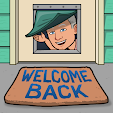 Along with the Cluetrain Manifesto (see other blog post), these are the other books I've read lately. I recommend all of them as being well-written, entertaining, and informative.
Along with the Cluetrain Manifesto (see other blog post), these are the other books I've read lately. I recommend all of them as being well-written, entertaining, and informative.
Two of the books are by Robert Kiyosaki, including the standard Rich Dad, Poor Dad as well as Before you Quit Your Job, one of the many follow-up books in the series. Although some people hate these books (typical of all personal finance and entrepreneurism books), I find his advice to be pretty solid and I agree with the distinctions that he makes between being an employee and being an entrepreneur. He makes an excellent point (pg. 48) about most business school graduates when he discusses the "bean counters." I have nothing against business schools per se having taught accounting for 17 years at various colleges and universities, but he is correct when saying that oftentimes when they take over a business the result is financial ruin due to their simplistic approaches to short-term cost savings. He also asserts that union representation is more needed by specialized workers with non-transferable skills (pg 138). Business schools basically teach people how to be employees. Employees rarely succeed beyond their wildest dreams. Kiyosaki also writes a column for Yahoo! Finance. Small Pieces, Loosely Joined, by David Weinberger. He has many interesting questions about the Web and how it is changing our lives and more than a few interesting answers. Weinberger analyzes how the Internet has affected education, social interaction, business, and government. I especially enjoyed his treatment of the Web as "space" which is strange since it takes up no space but it feels like it does. Quoting Lawrence Lessig: "Someday, someone was going to notice that the Internet is not just virtual, but instead connects to, and fundamentally affects, society. In this rich and beautiful text, Weinberger weaves an account of the places in our social and conceptual fabric where the Internet will pull, and possibly tear. This is not a book about the Internet and society; it is about society, marked with the net. " You can read the first three chapters online if that suits you, although something funky happens to the text in both IE and Firefiox . Weinberger is also the publisher of JOHO (Journal of the Hyperlinked Organization), author of JOHO the Blog, a co-author of the Cluetrain Manifesto, and many other things.
Small Pieces, Loosely Joined, by David Weinberger. He has many interesting questions about the Web and how it is changing our lives and more than a few interesting answers. Weinberger analyzes how the Internet has affected education, social interaction, business, and government. I especially enjoyed his treatment of the Web as "space" which is strange since it takes up no space but it feels like it does. Quoting Lawrence Lessig: "Someday, someone was going to notice that the Internet is not just virtual, but instead connects to, and fundamentally affects, society. In this rich and beautiful text, Weinberger weaves an account of the places in our social and conceptual fabric where the Internet will pull, and possibly tear. This is not a book about the Internet and society; it is about society, marked with the net. " You can read the first three chapters online if that suits you, although something funky happens to the text in both IE and Firefiox . Weinberger is also the publisher of JOHO (Journal of the Hyperlinked Organization), author of JOHO the Blog, a co-author of the Cluetrain Manifesto, and many other things. Freakonomics, by Levine and Dubner. In case you've missed it, this book created a great deal of controversy when it first came out. Several chapters have provocative (Boys and girls, can you say "off the wall"? Sure, I knew you could) theories, ideas, or assertions; such as the following: (1) legalized abortion has reduced the crime rate, (2) there is overwhelming evidence of cheating by teachers and students on standardized tests in the wake of No Child Left Behind, (3) more money doesn't actually help political candidates get elected, and (4) it is 100 times more likely that your child would be harmed while visiting the home of a friend with a swimming pool than one with a gun in the house.
Freakonomics, by Levine and Dubner. In case you've missed it, this book created a great deal of controversy when it first came out. Several chapters have provocative (Boys and girls, can you say "off the wall"? Sure, I knew you could) theories, ideas, or assertions; such as the following: (1) legalized abortion has reduced the crime rate, (2) there is overwhelming evidence of cheating by teachers and students on standardized tests in the wake of No Child Left Behind, (3) more money doesn't actually help political candidates get elected, and (4) it is 100 times more likely that your child would be harmed while visiting the home of a friend with a swimming pool than one with a gun in the house.
Between keeping up with the writings of about 75 bloggers and making this serious dent in my off-line book reading list, I've probably never read this much in my life except probably when I was a student and had reading forced upon me. My biggest problem is that the more I read the more I want to make a substantial change in my lifeand career. That doesn't even make sense, but there's probably nothing I can do about that.
Friday, June 30, 2006
Good Reads
Subscribe to:
Post Comments (Atom)




No comments:
Post a Comment